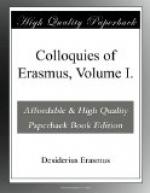Le. As far as I see, we scan it upon our Fingers to no Purpose. Do you help us out if you can.
Eu. To see how small a Matter sometimes puzzles Men, though they be good Scholars! The Preposition ex belongs to the End of the foregoing Verse.
Qui bene vertendo,
et eas describendo male, ex
Graecis bonis
Latinas fecit non bonas.
Thus there is no Scruple.
Le. It is so, by the Muses. Since we have begun to scan upon our Fingers, I desire that somebody would put this Verse out of Andria into its Feet.
Sine invidia laudem invenias, et amicos pares.
For I have often tri’d and could do no good on’t.
Le. Sine in is an Iambic, vidia an Anapaestus, Laudem in is a Spondee, venias an Anapaestus, et ami another Anapaestus.
Ca. You have five Feet already, and there are three Syllables yet behind, the first of which is long; so that thou canst neither make it an Iambic nor a Tribrach.
Le. Indeed you say true. We are aground; who shall help us off?
Eu. No Body can do it better than he that brought us into it. Well, Carinus, if thou canst say any Thing to the Matter, don’t conceal it from your poor sincere Friends.
Ca. If my Memory does not fail me, I think I have read something of this Nature in Priscian, who says, that among the Latin Comedians v Consonant is cut off as well as the Vowel, as oftentimes in this Word enimvero; so that the part enime makes an Anapaestus.
Le. Then scan it for us.
Ca. I’ll do it. Sine inidi is a proseleusmatic Foot, unless you had rather have it cut off i by Syneresis, as when Virgil puts aureo at the End of an heroick Verse for auro. But if you please let there be a Tribrach in the first Place, a lau is a Spondee, d’inveni a Dactyl, as et a a Dactyl, micos a Spondee, pares an Iambic.
Sb. Carinus hath indeed got us out of these Briars. But in the same Scene there is a Place, which I can’t tell whether any Body has taken Notice of or not.
Hi. Prithee, let us have it.
Sb. There Simo speaks after this Manner.
Sine
ut eveniat, quod volo,
In Pamphilo ut
nihil sit morae, restat Chremes.
Suppose it happen, as I desire, that there be no delay in Pamphilus; Chremes remains.
What is it that troubles you in these Words?
Sb. Sine being a Term of Threatning, there is nothing follows in this Place that makes for a Threatning. Therefore it is my Opinion that the Poet wrote it,
Sin eveniat, quod volo;
that Sin may answer to the Si that went before.




